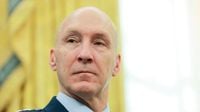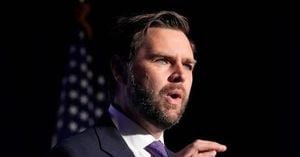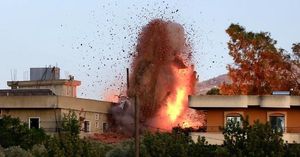Gen. David Allvin, the United States Air Force’s top uniformed officer, is stepping down two years into his four-year term, a move that has sent ripples through the Pentagon and reignited debate over the Trump administration’s ongoing overhaul of military leadership. The Air Force announced Allvin’s early retirement on August 19, 2025, confirming that he will continue to serve as chief of staff until the Senate confirms a replacement, with his official departure expected around November 1.
Allvin’s abrupt exit is not an isolated event. According to AP News and CNN, it comes amid a series of high-profile departures and dismissals of senior military officials during President Donald Trump’s second term, a period marked by Defense Secretary Pete Hegseth’s aggressive campaign to restructure the military’s upper ranks. The Air Force’s statement, while confirming Allvin’s plans to retire, offered no explanation for the early departure. However, a source familiar with the matter told CNN that Allvin decided to step down after learning Hegseth was planning to push him out of the job.
This latest shake-up has caught many in Washington off guard. One defense official, speaking to CNN, described the announcement as "very unexpected," noting there was no prior indication that Allvin, a career officer with more than 4,600 flying hours as a command pilot, planned to leave early. Allvin was appointed chief of staff by President Joe Biden in November 2023 after serving as vice chief of staff during Trump’s first term—a role that put him at the center of Air Force operations and strategy.
In a statement released by the Air Force, Allvin expressed gratitude for the opportunity to serve, saying, "I’m grateful for the opportunity to serve as the 23rd Air Force Chief of Staff and I’m thankful for Secretary Meink, Secretary Hegseth and President Trump’s faith in me to lead our service." He continued, "More than anything, I’m proud to have been part of the team of Airmen who live out our core values of integrity, service and excellence every day as we prepare to defend this great nation."
Secretary of the Air Force Troy E. Meink also issued a statement lauding Allvin’s leadership and vision. "The Air Force is fortunate to have leaders like General Dave Allvin. During his tenure, the Air Force has undertaken transformational initiatives that will enable Airmen to answer their nation’s call for decades to come," Meink said. He added, "General Allvin has been instrumental in my onboarding as the department’s 27th Secretary and I’m forever grateful for his partnership as well as his decades of exemplary service to our nation."
Allvin’s early retirement is the latest in a string of sudden departures among the military’s top brass since Trump began his second term. In January, Trump directed the firing of Coast Guard Commandant Adm. Linda Fagan. The following month, he removed Gen. CQ Brown Jr.—the second Black general to serve as chairman of the Joint Chiefs of Staff—from his post, with Air Force Gen. Dan Caine stepping in as his successor. Chief of Naval Operations Adm. Lisa Franchetti was also dismissed, as was Cyber Command chief Gen. Timothy Haugh in April. According to AP News and CNN, these moves are widely seen as part of Defense Secretary Hegseth’s initiative to reduce the number of senior military positions and, in his words, "increase efficiency."
Hegseth’s approach has been controversial. Supporters argue that the shake-up is necessary to streamline decision-making and cut through what they perceive as bureaucratic bloat at the Pentagon. Critics, however, see the trend as a purge of experienced leaders—especially those believed to endorse diversity, equity, and inclusion programs—undermining the military’s ability to maintain continuity and morale at the highest levels. The firing of Gen. CQ Brown Jr., in particular, drew national attention not only for its abruptness but also because Brown was only the second Black officer to hold the prestigious chairmanship of the Joint Chiefs of Staff. His replacement, Gen. Dan Caine, now faces the challenge of leading in a climate of uncertainty and rapid change.
Allvin’s career has spanned more than three decades and included service as a command pilot with over 4,600 flying hours. He was known for his steady leadership and commitment to the Air Force’s core values. His appointment as chief of staff in 2023 was seen as a nod to continuity following a period of transition. Now, his early departure leaves the Air Force facing another period of adjustment. The Senate will play a crucial role in confirming his successor—a process that, in recent years, has sometimes been fraught with political tension.
The broader context for these changes is a Pentagon in flux. Since the start of Trump’s second term, the administration has made it clear that it intends to reshape the military’s leadership in line with its priorities. Hegseth’s plan to slash senior positions is part of what he calls an "efficiency effort," though it has been met with skepticism by some in Congress and within the military itself. The lack of detailed explanations for each departure has fueled speculation and concern among defense analysts and lawmakers alike.
For many in the Air Force, Allvin’s departure is more than just another personnel change. His leadership during a time of "transformational initiatives," as Secretary Meink put it, has left a mark on the service. Airmen who served under Allvin have cited his emphasis on integrity, service, and excellence—values that have long defined the Air Force’s ethos. As the service prepares for its next chapter, questions remain about how the leadership changes will affect its readiness and ability to adapt to new challenges, both at home and abroad.
As the Senate prepares to consider Allvin’s replacement, the spotlight remains on the Trump administration’s approach to military leadership. The rapid turnover at the highest levels of command, paired with the administration’s stated goals of efficiency and reform, has left many wondering what the future holds for the Air Force and the broader U.S. military establishment. For now, the Air Force will continue under Allvin’s steady hand until a new chief of staff is confirmed, but the uncertainty surrounding his early retirement is likely to linger long after he steps down.
With a legacy of service and a reputation for integrity, Gen. David Allvin’s early exit marks a significant moment for the Air Force, underscoring the broader tensions and transformations shaping the U.S. military today.




